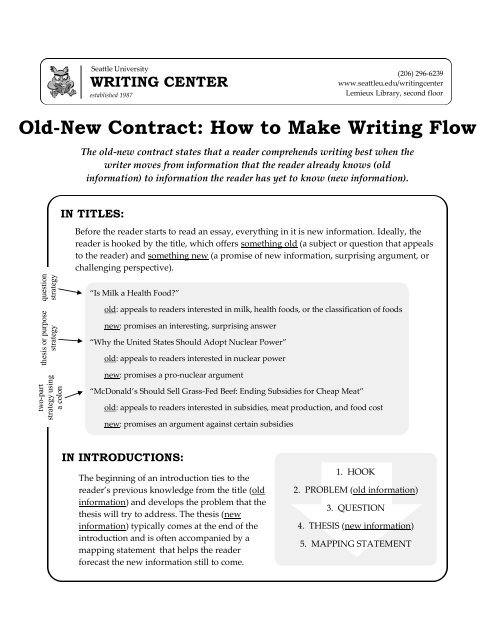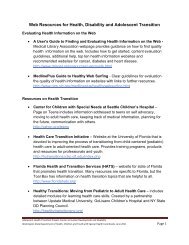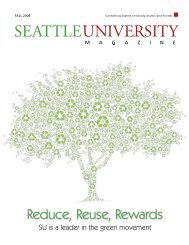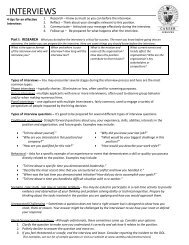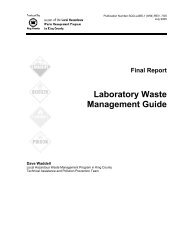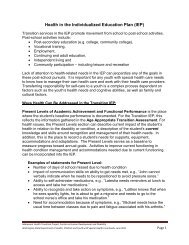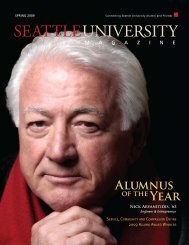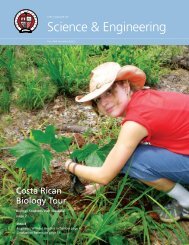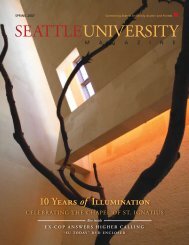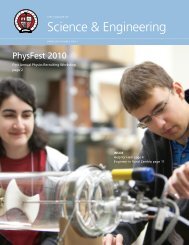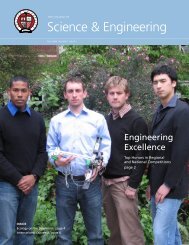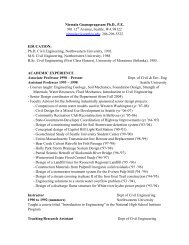Old-New Contract: How to Make Writing Flow - Seattle University
Old-New Contract: How to Make Writing Flow - Seattle University
Old-New Contract: How to Make Writing Flow - Seattle University
You also want an ePaper? Increase the reach of your titles
YUMPU automatically turns print PDFs into web optimized ePapers that Google loves.
two-part<br />
strategy using<br />
a colon<br />
question<br />
strategy<br />
thesis or purpose<br />
strategy<br />
<strong>Seattle</strong> <strong>University</strong><br />
WRITING CENTER<br />
established 1987<br />
(206) 296-6239<br />
www.seattleu.edu/writingcenter<br />
Lemieux Library, second floor<br />
<strong>Old</strong>-<strong>New</strong> <strong>Contract</strong>: <strong>How</strong> <strong>to</strong> <strong>Make</strong> <strong>Writing</strong> <strong>Flow</strong><br />
The old-new contract states that a reader comprehends writing best when the<br />
writer moves from information that the reader already knows (old<br />
information) <strong>to</strong> information the reader has yet <strong>to</strong> know (new information).<br />
IN TITLES:<br />
Before the reader starts <strong>to</strong> read an essay, everything in it is new information. Ideally, the<br />
reader is hooked by the title, which offers something old (a subject or question that appeals<br />
<strong>to</strong> the reader) and something new (a promise of new information, surprising argument, or<br />
challenging perspective).<br />
“Is Milk a Health Food?”<br />
old: appeals <strong>to</strong> readers interested in milk, health foods, or the classification of foods<br />
new: promises an interesting, surprising answer<br />
“Why the United States Should Adopt Nuclear Power”<br />
old: appeals <strong>to</strong> readers interested in nuclear power<br />
new: promises a pro-nuclear argument<br />
“McDonald’s Should Sell Grass-Fed Beef: Ending Subsidies for Cheap Meat”<br />
old: appeals <strong>to</strong> readers interested in subsidies, meat production, and food cost<br />
new: promises an argument against certain subsidies<br />
IN INTRODUCTIONS:<br />
The beginning of an introduction ties <strong>to</strong> the<br />
reader’s previous knowledge from the title (old<br />
information) and develops the problem that the<br />
thesis will try <strong>to</strong> address. The thesis (new<br />
information) typically comes at the end of the<br />
introduction and is often accompanied by a<br />
mapping statement that helps the reader<br />
forecast the new information still <strong>to</strong> come.<br />
1. HOOK<br />
2. PROBLEM (old information)<br />
3. QUESTION<br />
4. THESIS (new information)<br />
5. MAPPING STATEMENT
<strong>Seattle</strong> <strong>University</strong><br />
WRITING CENTER<br />
established 1987<br />
QUICKTIPS<br />
Transitions<br />
<strong>Old</strong>-new contract can also be practiced on the sentence level by using transitional<br />
words or phrases. Transitions function as signposts, signaling <strong>to</strong> the reader that the<br />
road is turning. (You wouldn’t like for the reader <strong>to</strong> drive off a cliff, would you?)<br />
FUNCTION<br />
WORDS OR PHRASES<br />
<br />
sequence<br />
<br />
first, second, third, next, finally, earlier, later,<br />
meanwhile, afterward<br />
<br />
restatement<br />
<br />
that is, in other words, <strong>to</strong> put it another way<br />
<br />
replacement<br />
<br />
rather, instead<br />
<br />
example<br />
<br />
for example, for instance, case in point<br />
<br />
reason<br />
<br />
because, since, for<br />
<br />
consequence<br />
<br />
therefore, hence, so, consequently, then, as a<br />
result, accordingly, as a consequence<br />
<br />
denied consequence<br />
<br />
still, nevertheless, even so<br />
<br />
concession<br />
<br />
although, even though, granted that<br />
<br />
similarity<br />
<br />
in comparison, likewise, similarly<br />
<br />
contrast<br />
<br />
however, in contrast, conversely, on the other<br />
hand, but, on the contrary<br />
<br />
addition<br />
<br />
in addition, also, moreover, furthermore<br />
<br />
conclusion<br />
<br />
in brief, in sum, in short, in conclusion, <strong>to</strong><br />
sum up, <strong>to</strong> conclude<br />
© <strong>Seattle</strong> <strong>University</strong> <strong>Writing</strong> Center | Oc<strong>to</strong>ber 2012<br />
content adapted from “Teaching <strong>Old</strong>-Before-<strong>New</strong>” by Dr. John Bean<br />
“The Science of Scientific <strong>Writing</strong>” by George Gopen and Judith Swan<br />
* For more tips like these, check out seattleu.edu/writingcenter/resources.


